Wolf Spirit: the Secret Weapon of China’s Tech Giants? | China Buzz Report
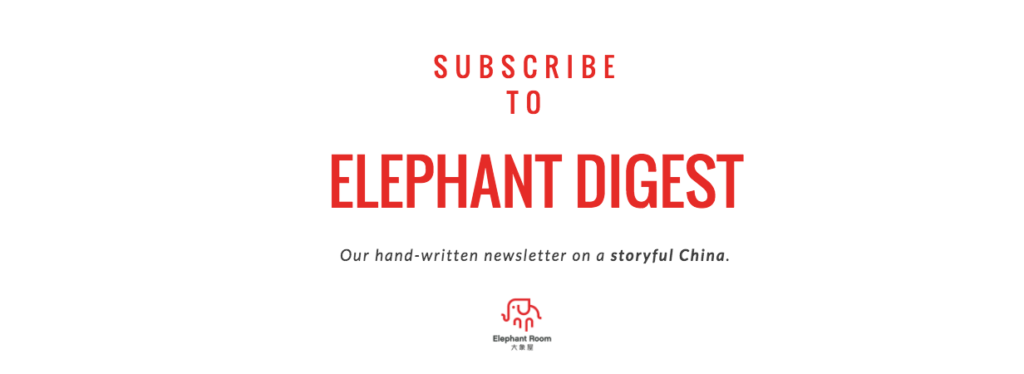
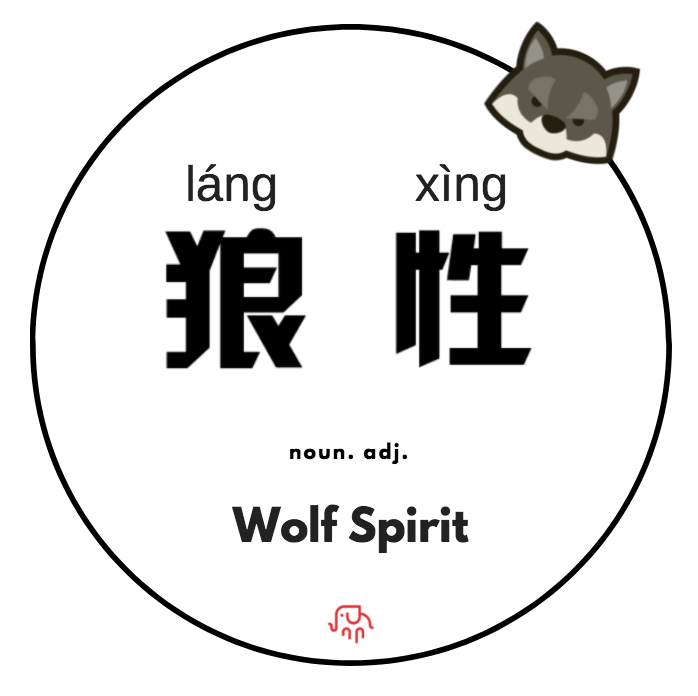
- Where did we find the buzz:
Inside China's tech circle (well-established giants as well as internet startups).
- Who's buzzing about it:
Leaders and executives who are trying to push employees to overwork; striving, hard-working young people who are aggressively climbing their way up on the social latter.
- Why is important:
1) Wolf Spirit speaks about a unique cooperate culture that helped China's tech giants to success with rapid speed;
2) It also reflects a popular belief held among Chinese young people : seeing working harder to be both the ultimate drive and goal of life.
Who's Talking
As much as we despise Baidu Baike (no joke, it really sucks in terms of accuracy and objectivity), when it comes to definition-hunting for our buzz words, it still works as a starting point.
And here’s what Baidu says about "狼性", aka “Wolf Spirit” and “Wolf Culture”:

“Wolf Spirit is a unique form of business culture. It asks companies to inject the four characteristics of wolves: wild, cruel, greedy and violent into management and day to day operations. With Wolf Spirit, employees would aim high and are never content with their current situation. In a company, employees should act as wolves to work and learn ruthlessly.”
Pretty clear right? But wait, give it one more think and you’ll realize there are more unanswered questions under this adjective-packed Baidu definition. So a company should act like a wolf, fine. But how? Why? Why wolf, and why Chinese companies at this time?
As always, we have a lot of questions, and before anything, we grabbed people around us to find out their answers.
Q: Have you heard of the term Wolf Spirit? What's your definition of it?
Friend A: “I think Wolf Spirit is a desire to win. ”
Friend B: “Like you would do anything, by hook or by crook.”
Friend C: “A reckless way of handling KPI…which sucks.”
Friend D: “??? Like aggressive predator-ish??”
As our interviews went along, we noticed an interesting trend: while all of the friends we bugged are in their 20s or 30s with busy careers, those working in tech or startups generally had better understandings about the meanings of Wolf Spirit. Is Wolf Spirit a unique phenomenon hyped out by China's tech industry, or does it reflect a more general thinking about life and success in today's Chinese society?
To find out, we need to go back to the early days of the story.
The Beginning of Things
Wolf As as a Cultural Symbol
It all began with a book, and a person.
In 2004, Chinese writer Jiang Rong published his semi-autobiographical novel Wolf Totem. Writing about the experiences of a young student from Beijing who finds himself sent to the countryside of Inner Mongolia in 1967 (at the height of Cultural Revolution)[1], the book exhibited strong sales immediately after its initial release, selling 50,000 copies in 2 weeks and over 4 million copies in China by 2006.
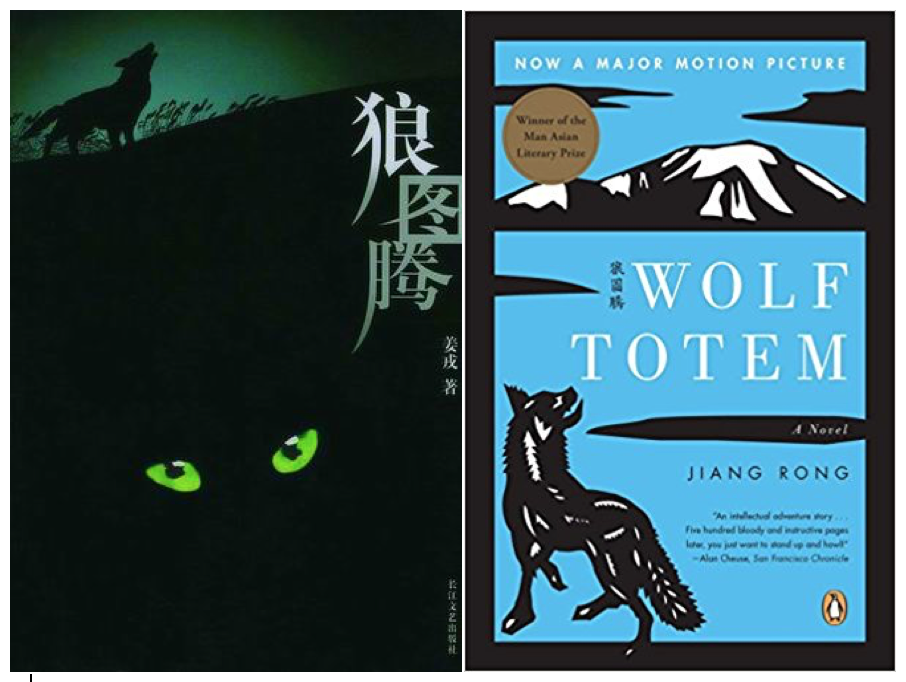
The Chinese and English versions of the best-selling novel Wolf Totem.
As one of the top-selling Chinese novels in a decade, Wolf Totem compares the culture of the Mongolian nomads and ethnic Han as Wolf versus sheep[2], phrasing the former’s unyieldingness, hardship and teamwork spirit to the latter’s more delicate and submissive social organization. Very quickly, wolves became a popular cultural symbol among a generation of Chinese readers; many fans began to obsessively deconstruct the animal meanings of wolves as a spiritual guidance for human social behaviors.
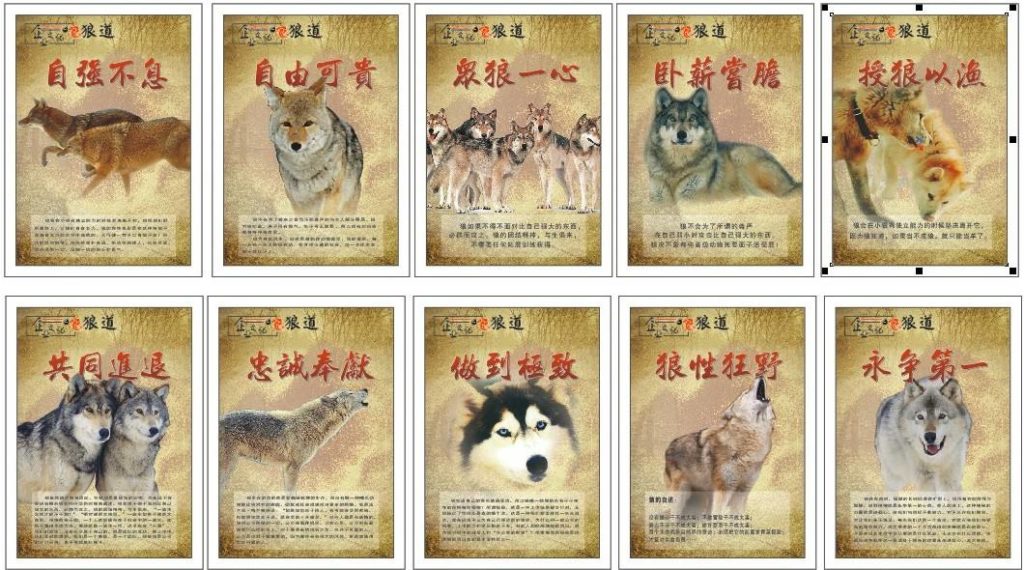
A Chinese company's educational poster lists out 10 positive virtues of wolves and encourage its teams to learn from them.
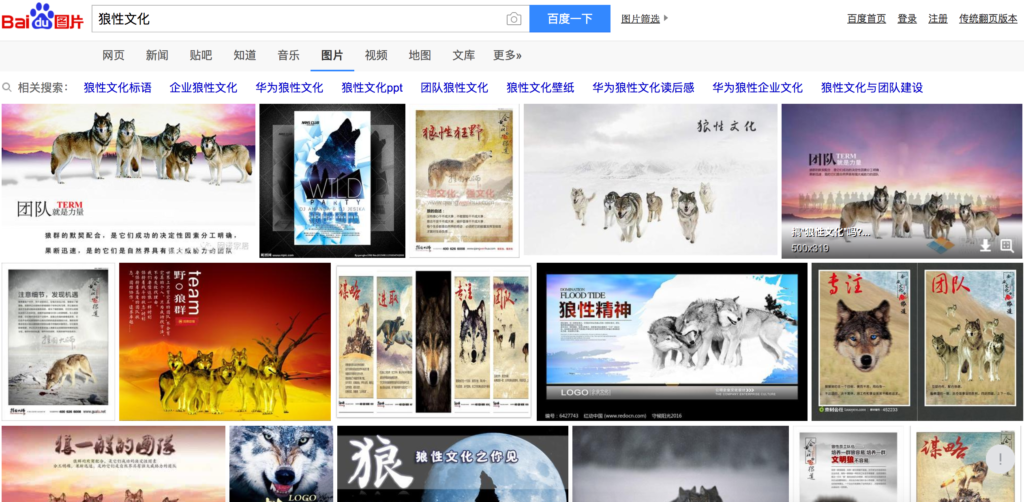
And there are tons of similar posters....
From Popular Culture to Business Mantra
Despite the book’s popularity, Wolf Totem didn't coin Wolf Spirit as a term until Chinese netizens discovered speech from another guy - Mr. Ren Zhengfei.
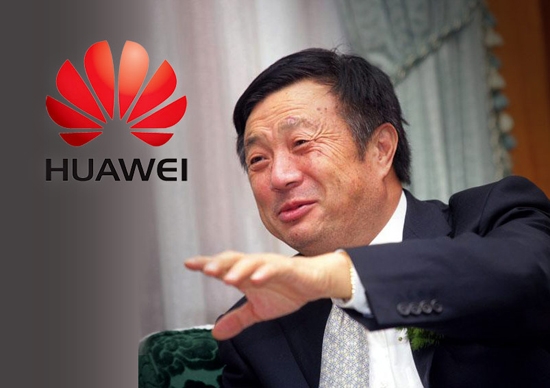
Mr. Ren Zhengfei. (Photo from: allchinatech)
As the founder and president of Huawei, Mr. Ren single-handedly founded the company with 21,000 yuan (around 5,000 dollars at the time!) in 1987, and made it into a leading global telecom powerhouse (Huawei is, in many senses, the most “global” Chinese companies ever: its products and services have been deployed in more than 170 countries, and it is currently the largest telecommunication equipment manufacturer in the world [3] with one third of the world population using its services by 2015 [4]).
Huawei's secret? Wolf Spirit. (According to Ren, at least)
According to online sources, Ren famously spoke about his understanding of Wolf Spirit as such:
“We all know that wolves have three significant characteristics: sensitive smell, perseverance, and teamwork. In order for an enterprise to expand and success, it must carry these all of the three wolf elements; everyone should be able to fight individually while also predate ruthlessly as a team.”
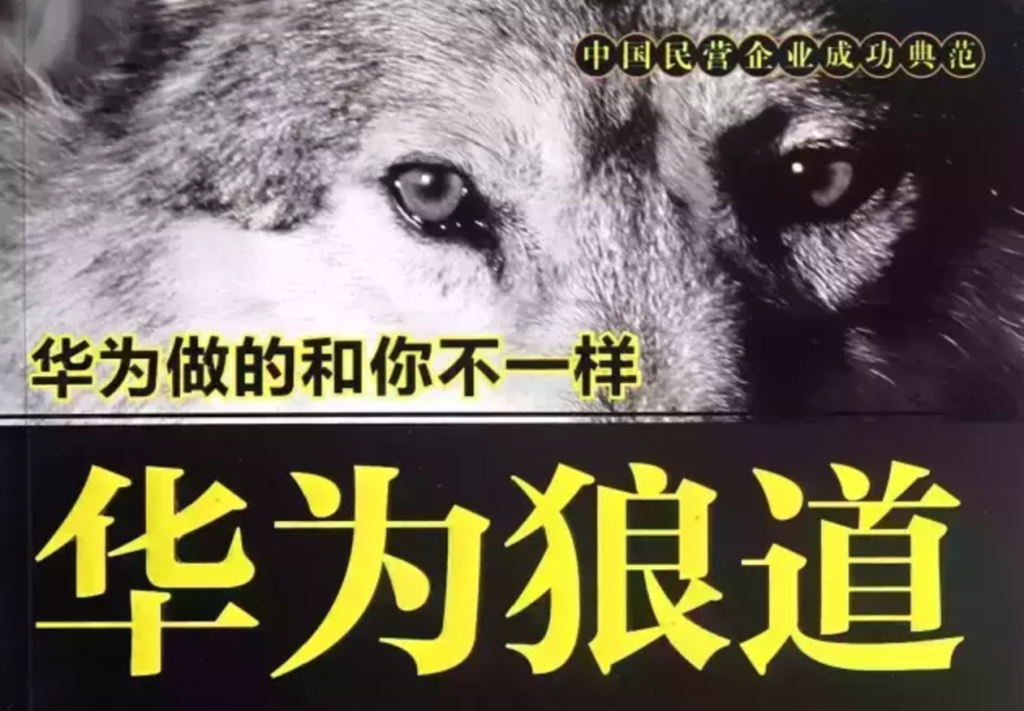
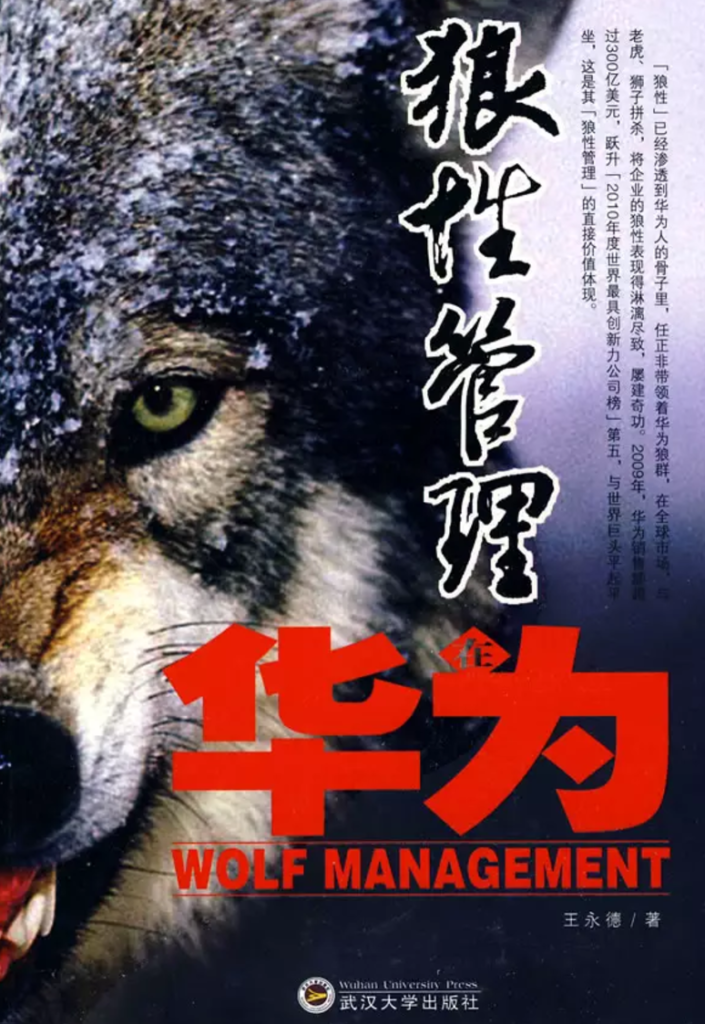
Some of the Chinese books marketed as to decode Huawei's Wolf culture.
Ren spoke about Wolf Spirit. Ren built Huawei into a super successful company. And voilà! People who also wanted to make successful companies turned Wolf Spirit into their cult new religion.
To consolidate a religion into a popular belief system, tales are incredibility important. In the case of Huawei and its Wolf Spirit, the most famous tale goes as such:
In the early days of Huawei, every employee was given a military-style mattress under their desks. Obviously not for taking back to apartments/dorms, these mattresses were for those who worked so hard that there was no longer the need to leave the office: you work, you pull out the mattress to sleep for a while, then you work more – such was the so-called “mattress culture” of Huawei, and the substantial story of Huawei’s wolf alike company culture that, at least according to public imaginations, led to the company's ultimate success.
Wolf Spirit Meets the Tech Industry
Biyi: So, what do you think about Huawei’s Wolf Spirit culture?
Yan: I personally don’t know anyone works at Huawei, so I can’t speak about real-people experience. But judging from Ren and the company’s overall image, I think Wolf Spirit holds virtue at least in making a good company?
Biyi: How do you measure the good of a company though? By revenue then sure, but if you use other indicators like, say, overall happiness of employees, then I am not sure how to assess Huawei's performance.
Yan: It's not just Huawei anymore. Almost every tech company in China is now praising Wolf Spirit as the new management mantra. Have you heard of the term “996?”
996 And The Culture of Over-working
9 am to 9 pm, 6 days a week – the mock phrase “996” is familiar for many that (over)work in China’s tech startups and established giants.
Obviously, 0ver-working is a sensitive issue that no companies would openly admit or talk about, but just give you some alleged examples -
- Alibaba is said to be one of the pioneers for the 996 work schedule, and Jack Ma once said in a public speech, “We ask three people to accomplish a job of five people, and pay them for four.” (interesting way of thinking isn’t it…)
- 58.com, the leading classifieds site in China, was reported in 2016 that it demanded all employees work a 996 schedule with no extra subsidies[5].
- During the early years of Xiaomi, its software development team would work beyond 996, holding meetings at midnight for most days of the week.
- According to online source, JD’s vice president He Gang once sent an internal email to its Cloud Service's management team asking for the implementation of “at least 70 hours of work per week”.
- Employees of Huawei were asked to “voluntarily” sign a declaration to classify themselves as “strivers”, which means that they'd give up rights of paid leaves and overwork subsidies. (Signing the “striver agreement” is considered a declaration in loyalty; those who choose to stay as ordinary employees could still enjoy welfare, but they stood a much lower chance in career progress.)
- In a publicly circulated internal-letter, Robin Li, the founder and CEO of Baidu, called on the management team to "get ride of those that do not have Wolf Spirit", specifically, those who "believe work is only part of life" and "consider the comfort of live as their ultimate life goal".
Biyi: I guess neither of us would be able to get in China's tech company then...
Yan: (roll eyes) Even if we got in, we wouldn't be able to survive it anyways...
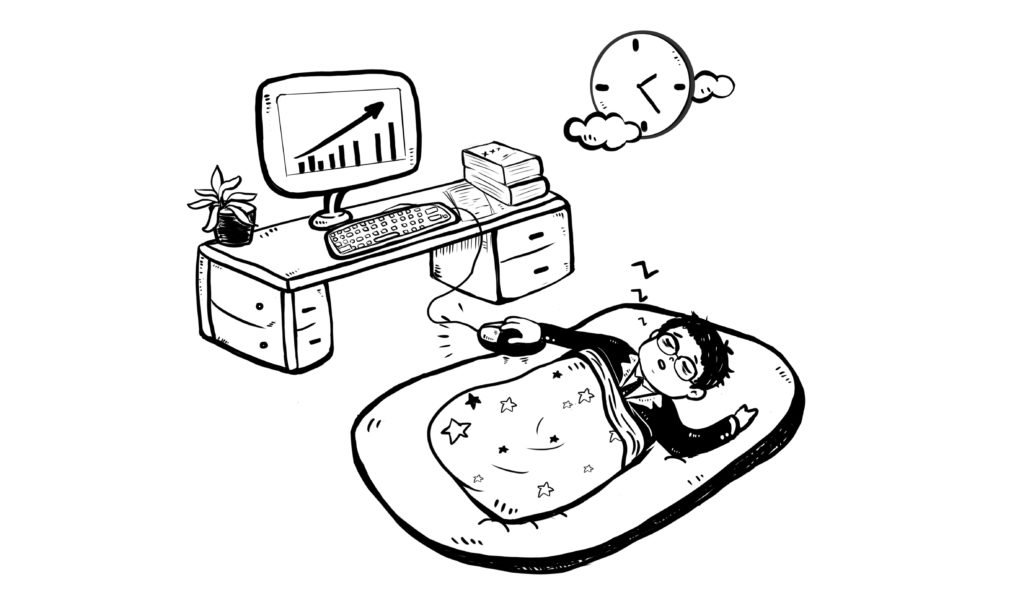
What's more interesting (the idea of capitalists extracting labor value through over-working and under-paying is obviously not fun and, legally and morally wrong) than Chinese tech companies’ workplace culture is the ways people have responded towards it. A lot were angry of course (in fact, 58’s implementation of 996 sparked a huge wave of online protest from its staffs), yet many chose to accept, or even considered over-working to be a positive, Wolf Spirit virtue.
Driving by a strong desire to change their social status, many Chinese workforces, especially the young ones, are willing to give up personal lives for the sake of a better, wealthier future. For them, long working hours become a way of life; instead of pursuing the work-life balance, those who consider themselves to be wolf-spirited would pour hearts and soul into work, work, and more work.

A Zhihu user asking, “as a young person, am I wasting my life if I choose NOT TO work in a 9-9-6 tech company?”

“Ever since my boyfriend started working at Alibaba, he never leaved the office before 10pm.”

“Once 996 becomes the norm, no one has the guts to get off work on time. Even those finished early will wait until at least 9pm to leave the office.”
“Retreat is Never an Option”
Besides long working hours, there is another side of Wolf Spirit that China's tech companies are more willing to publicly share about: their aggressive, ruthless tactics in fighting against competitors.
Cheng Wei, the CEO of Didi Chuxing, once publicly described the company as “born in the wolf den” (and apparently, he even formed an internal team named “The Wolf Totem” for fighting the market war against Uber). During the famous subsidy war against Kuaidi over the first few months of 2014, Didi brought its wolf spirit to the extreme. In mere 2 weeks, the number of orders have increased by over 50 times. In order to maintain a stable service facing the rapidly growing users, the CTO of Didi, Zhang Bo, spent 7 days and nights with the tech team to rewrite the server architecture.
“On the day we came out of the building, everybody stunk. One engineer rushed to the emergency room of his pregnant wife, another couldn’t even take out his contact lenses.” Zhang Bo recalled some team members were even delusional, “someone shouted there’s an earthquake, all the team rushed out of the building, later we realized we were the only ones who felt the shake.”
“Retreat was never an option, we just have to conquer all the difficulties, that’s part of the culture of Didi.” Says Zhang Bo.
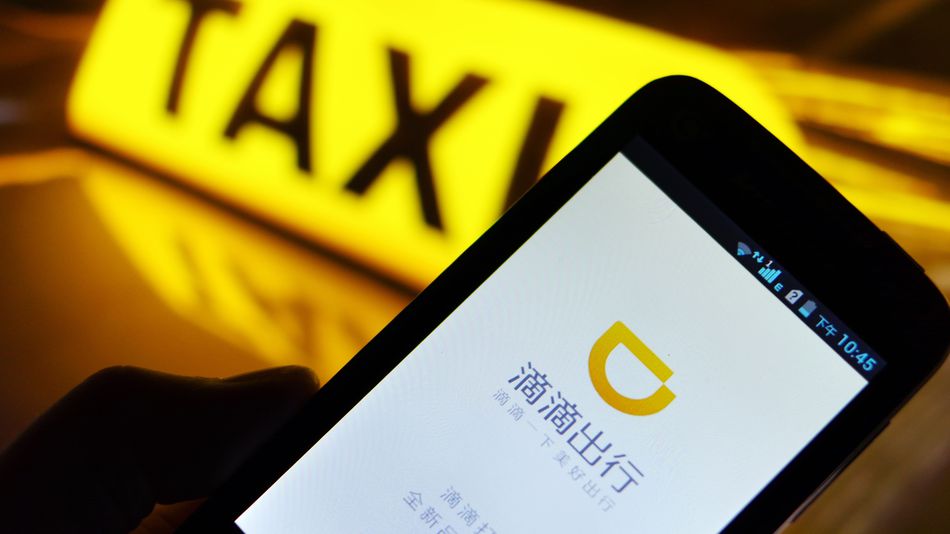
Didi is widely known as a company that executed Wolf Spirit to the extreme.
Biyi: Since I came back to China a few month ago, I’ve met so many driven young people that are dedicated and diligent, executing their careers goals with stunning skills. They are truly wolf-spirited!
Yan: So do you consider yourself wolf-spirited too?
Biyi: No way, you know how laid-back I am! Never been a competitive person...
Yan: But competitiveness and hard-working are only part of Wolf Spirit aren't they? I think you are pretty self-driven and know what you want, that's Wolf Spirit too!
Biyi: Aha thanks for that! I think the kind of Wolf Spirit embedded in today's Chinese startup culture has a fundamental contradiction: isn’t it too simple to equate over-working with hard-working? What about productivity?
Yan: I feel there’s a tendency at these companies to put “work more” in face value; they are ignoring the obvious fact that quantity doesn't necessarily mean quality, and staying late doesn't get more work done.
Biyi: And from the management level, popularizing Wolf Spirit without comprehending its true meaning could be extremely dangerous. It wears down both the passion and creativity of individuals.
Yan: But, on the positive side, companies such as Didi really did outperform their rivalries because of their ruthless, aggressive culture. It probably explains the peculiar culture of praising Wolf Spirit; it’s useful, at least in the short-term.
Biyi: (Nodding) The majority of tech companies in China today are still just little wolf cubs I guess. To truly build themselves as innovative, globally-recognized reputable businesses, they need to, like you said, learn where and how to slow down, to set goals, make boundaries and follow the right rules.
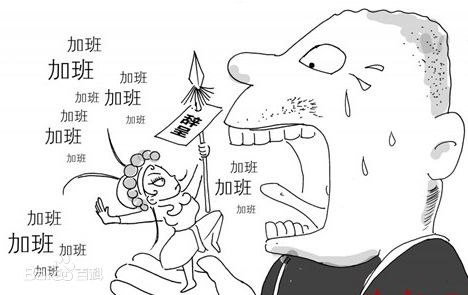
True Wolf Spirit is more than simple overworking.
Yan: You know, I have a friend who once applied jobs to a company famous for its Wolf Spirit culture. During the interview, the HR asked him, “are you ok with taking personal insults from your boss?”, he was mortified and didn’t know how to response.
Biyi: ...Wow...I was just about to say let's work harder, be more aggressive and you know, more wolf-alike...(slipping into the couch)
Yan: ![]()
![]()
![]()
Sources:
[1] [2]http://www.nytimes.com/2005/11/03/books/a-novel-by-someone-takes-china-by-storm.html
[3] https://www.bloomberg.com/news/articles/2011-09-15/at-huawei-matt-bross-tries-to-ease-u-dot-s-dot-security-fears
[4] http://consumer.huawei.com/en/about-us/index.htm
[5] https://www.chinatechinsights.com/analysis/1855422.html

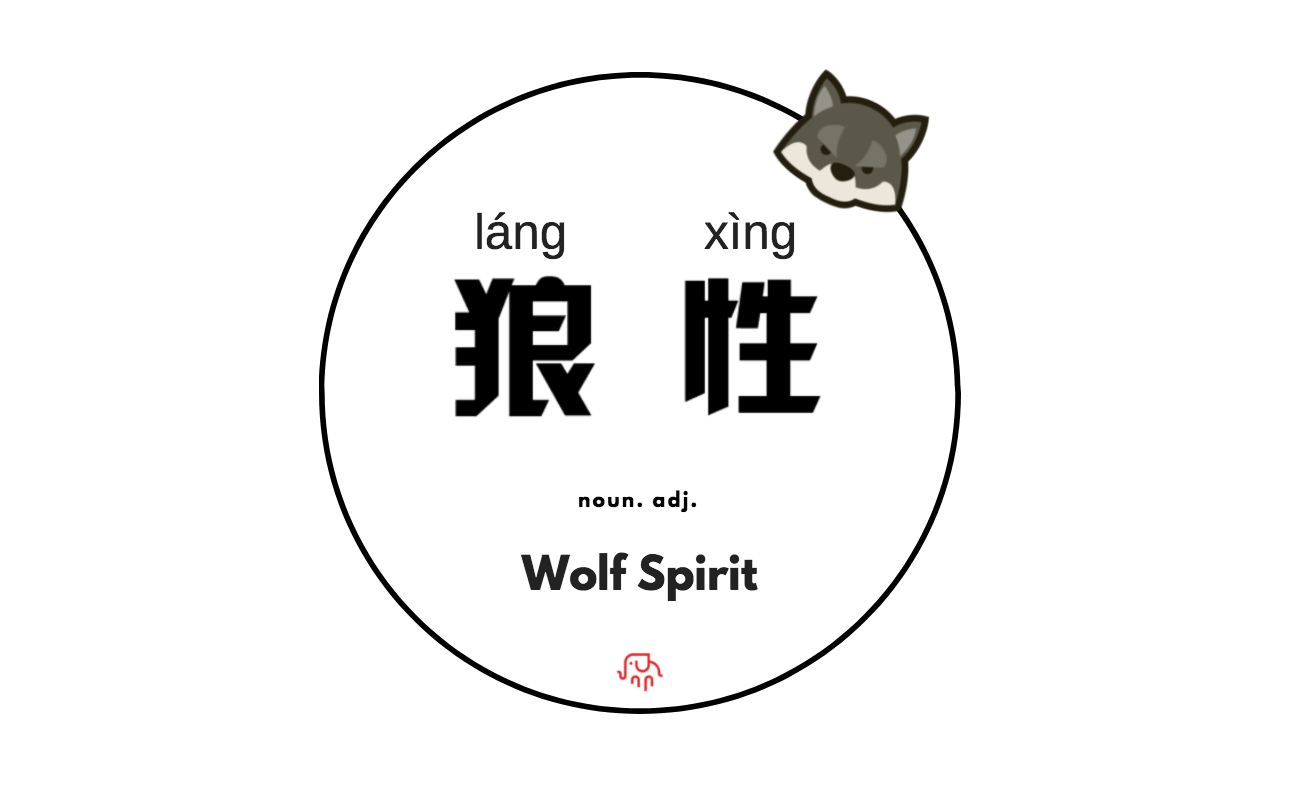
[…] Elephant room, n.d, wolf spirit, viewed on 7th September, 2018 http://elephant-room.com/2017/05/22/wolf/ […]
[…] [3] http://elephant-room.com/2017/05/22/wolf/ […]